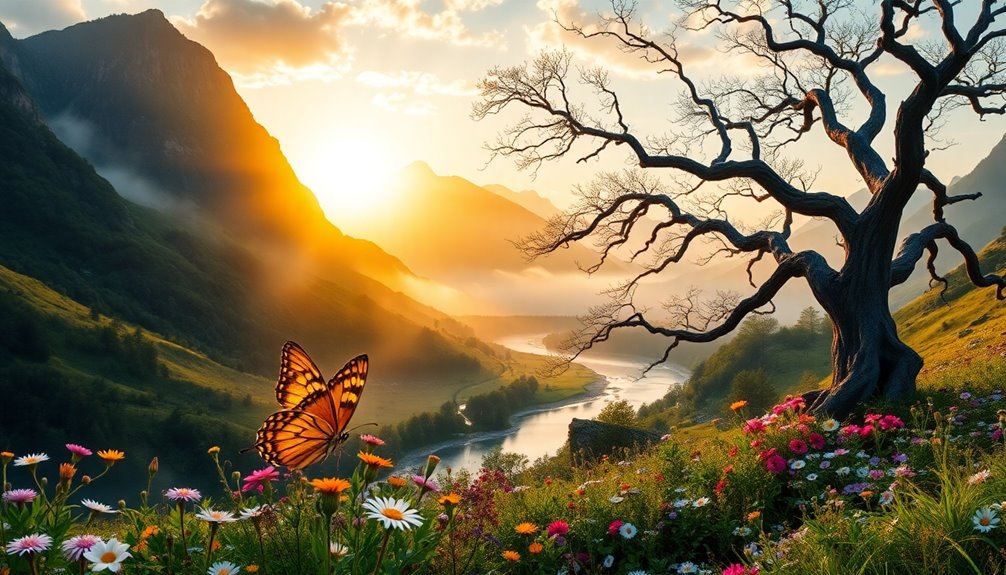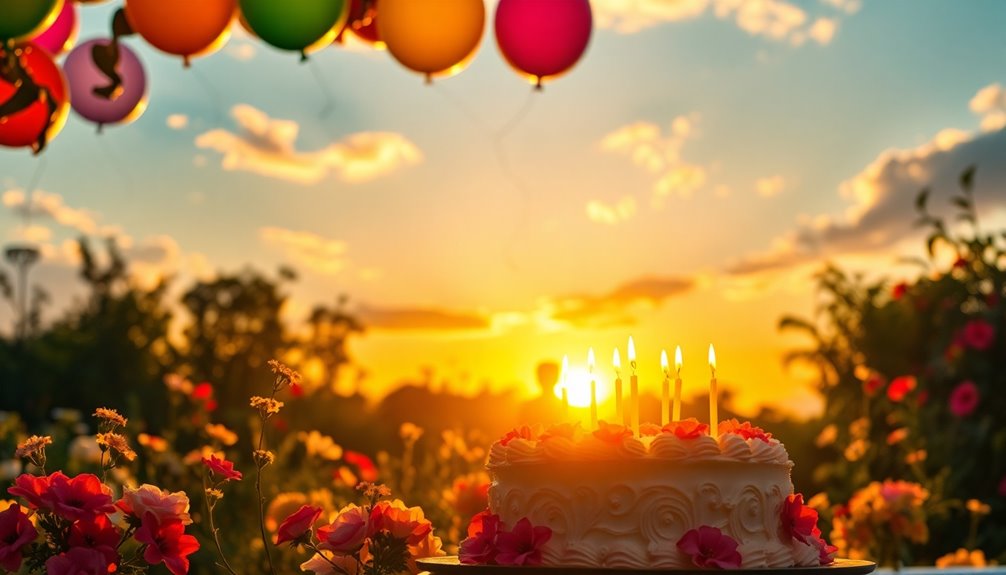When you explore poems about beauty, you'll find that they celebrate nature's finest creations in vivid, lyrical lines. Each verse paints landscapes of vibrant sunsets and tranquil waters, inviting you to feel the emotional connection of these sights. Symbolism plays a key role, with flowers representing joy and mountains embodying aspiration. As you engage with these works, you might reflect on your personal growth and insights inspired by the natural world. Poetry not only depicts beauty but also enhances your journey of self-discovery. There's so much more to uncover about how nature influences art and emotion!
Key Takeaways
- Nature's beauty inspires poetic imagery, celebrating vibrant sunsets, tranquil waters, and lush landscapes as symbols of peace and joy.
- Poems often reflect emotional connections to nature, enhancing self-awareness and promoting healing through expressive language and personal narratives.
- The diversity of beauty standards across cultures enriches poetic expression, allowing for unique interpretations of nature's finest creations.
- Writing about nature fosters community engagement, as shared experiences in poetry create lasting bonds and encourage constructive feedback among poets.
- Historical literary movements, like Romanticism, highlight nature's beauty as a source of inspiration, intertwining human emotion with the natural world.
Nature's Influence on Beauty
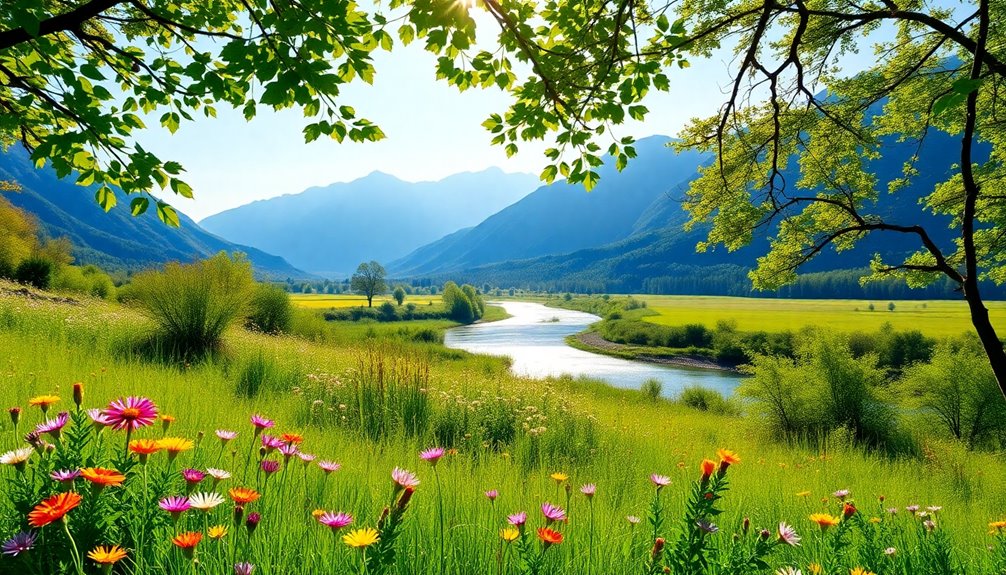
Nature captivates us with its stunning displays, revealing the profound influence it holds over our perception of beauty. When you take a moment to appreciate vibrant sunsets or the serene stillness of tranquil waters, you realize how these external elements evoke feelings of peace and joy. The intricate craftsmanship of Indonesian decor masks reflects a similar celebration of beauty through cultural artistry. Additionally, local artisans often draw inspiration from tropical design aesthetics to create unique pieces that enhance the beauty of our surroundings, much like the use of natural materials in Balinese interior design.
Nature's contrasts, from the rich colors of blooming flowers to the soft glow of fading daylight, enhance your idea of beauty, urging you to look deeper.
You never know how these experiences can shape your internal understanding of beauty. The gentle rustle of leaves or the fragrant scent of fresh blooms creates a sensory tapestry that forges emotional connections. Just as each mask tells a unique story, these moments in nature resonate with personal significance.
This intricate relationship between nature and human emotions highlights the transient nature of beauty, reminding you that like the blooming and wilting of flowers, moments of beauty are fleeting yet impactful.
As you explore natural landscapes, you may find that the appreciation of these external beauties fosters a deeper understanding of your own identity and inner beauty.
Nature, with its endless cycles and displays, teaches you that beauty isn't just what you see; it's a reflection of your feelings, thoughts, and experiences. Moreover, like the themes explored in Rhythm Failure's Lost Balloons, the fleeting moments of beauty can resonate deeply, evoking nostalgia and emotional connections.
The Power of Poetic Imagery
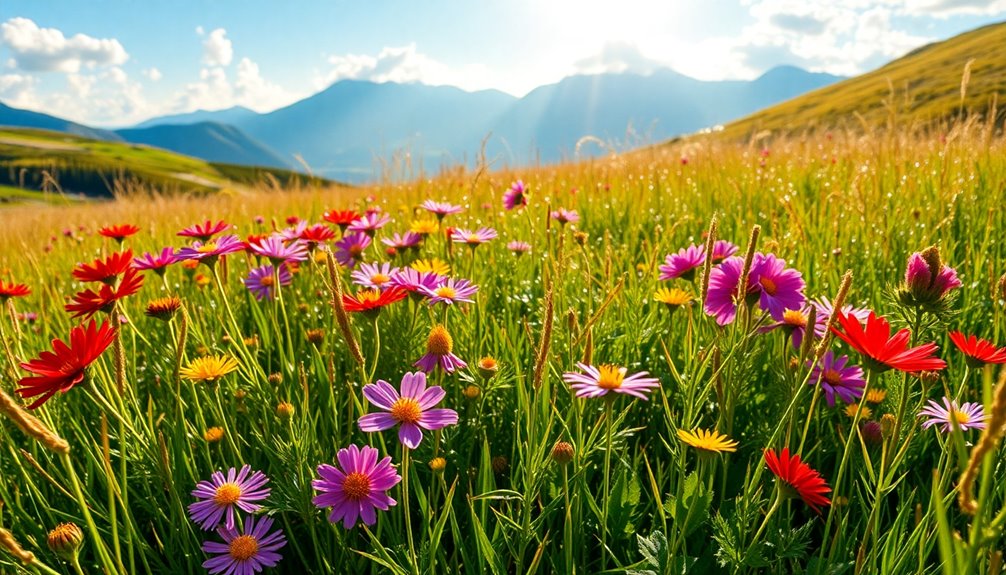
Experiencing beauty in nature often sparks creativity, leading to the creation of poetic imagery that captures these moments. When you immerse yourself in nature, you discover something that helps bridge the gap between your mind and heart. Poetic imagery utilizes vivid language to evoke sensory experiences, allowing you to visualize and emotionally connect with the subject matter. Essential oils, such as eucalyptus oil, can serve as a powerful reminder of nature's healing aspects, enhancing your sensory experience. Additionally, the presence of dietary fiber in natural foods like chia seeds can inspire reflections on the interconnectedness of health and beauty in our environment. Herbal teas, with their unique flavors, also provide a sensory journey that complements the beauty of the natural world, such as the probiotic properties found in beverages like kombucha.
Here's a quick look at how different elements enhance poetic imagery:
| Element | Description |
|---|---|
| Metaphors | Create striking comparisons, depicting a perfect image of beauty. |
| Sensory Details | Engage sight, sound, touch, taste, and smell to enrich your experience. |
| Symbolism | Infuse natural elements with deeper meanings, reflecting themes of life. |
| Emotional Resonance | Evoke strong responses, transforming simple descriptions into profound experiences. |
Emotional Connections in Nature
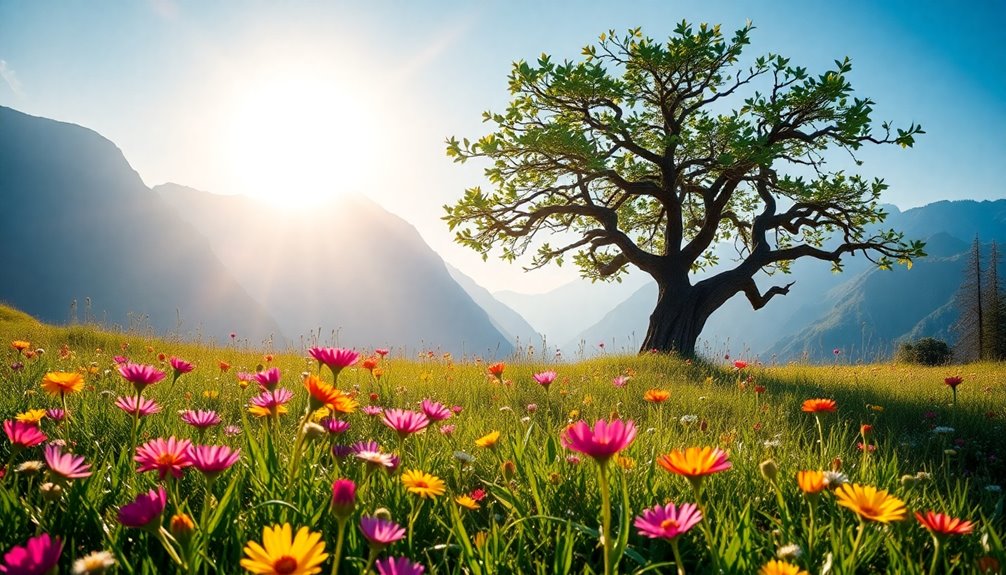
When you step into nature's serene embrace, you can't help but feel a deep connection to the world around you.
Each moment spent outdoors, whether it's watching a sunset or wandering through a forest, becomes a reflection of your own emotions. The calming effects of nature sounds can enhance your overall mood and emotional well-being. Additionally, studies show that engaging with antioxidants found in natural surroundings can further boost your mood and emotional health. These experiences not only foster love and connection with others but also enhance your appreciation for life's beauty. Additionally, engaging with nature can lead to transformative philosophical insights that deepen your understanding of existence and self-identity. The rhythmic sound of the waves crashing against the shore creates a calming beach environment that invites reflection and tranquility.
Nature's Serene Embrace
There's something magical about stepping into a lush forest or standing atop a majestic mountain, where the world seems to pause and breathe with you. In these serene spaces, nature helps us foster emotional connections, offering a sense of peace and tranquility. The gentle rustle of leaves and the sound of a babbling brook remind us of life's transient beauty, grounding us in the present moment.
As you wander through vibrant fields or gaze at breathtaking landscapes, you can't help but feel joy and inspiration wash over you. Nature helps us tap into our emotions, enhancing our mental well-being while reducing stress and anxiety. Engaging with these natural elements nurtures emotional resilience, allowing you to reconnect with yourself. Emotional resilience plays a crucial role in navigating life's challenges, enhancing our ability to cope with stress. Moreover, participating in outdoor activities can further bolster your well-being by providing effective relaxation techniques that promote calmness and reduce tension. Additionally, spending time in nature can enhance your executive function, supporting better decision-making and emotional regulation.
Shared experiences in nature, like hiking with friends or watching a sunset, create bonds that strengthen relationships. These moments foster a sense of community, reminding us that we're all intertwined in this beautiful tapestry of life. Additionally, spending time outdoors can reduce anxiety and depression symptoms, which further enhances our overall emotional health.
Embracing nature's serene embrace helps us not only appreciate our surroundings but also recognize the deeper connections we share with each other and the world around us.
Love and Connection
Amidst the beauty of nature, love and connection flourish in ways that can transform our lives. When you immerse yourself in the breathtaking landscapes—be it the majestic mountains or the gentle flow of rivers—you often feel a sense of peace and joy. Engaging with these environments can also enhance your awareness of emotional alignment, allowing you to connect more deeply with nature and those around you. Additionally, spending time in nature can contribute to improved air quality, enhancing your overall well-being. The best woods for farmhouse tables remind us of the beauty found in natural materials, further enriching our connection to the earth.
These natural settings uplift your spirit, fostering a sense of belonging that's hard to find elsewhere. As you and your loved ones share moments in these idyllic environments, your emotional bonds deepen, creating lasting memories. Each experience becomes a thread woven into the fabric of your relationships, illustrating how intertwined human emotions are with the natural world. The freedom symbolized by birds soaring through the sky resonates deeply, echoing the liberation and joy that come from meaningful connections.
Nature's storytelling capacity invites you to blend your personal narrative with its beauty, enriching your emotional ties. Remember those tranquil moments spent beneath a vast sky or beside a serene lake; they become touchstones of love, allowing you to reflect and grow together. In this sacred space, you discover that love and connection thrive, reminding you of the profound impact nature has on your heart and relationships. Additionally, engaging with nature can enhance your self-care practices, allowing you to nourish your emotional well-being.
Human Reflection in Nature
Experiencing the beauty of nature not only deepens your connections with others but also invites profound self-reflection. When you find yourself surrounded by lush trees or the gentle flow of a river, you often feel a wave of peace wash over you. This tranquility enhances your mental well-being and encourages you to explore your emotions. Engaging with nature can also lead to improved mental health outcomes, reinforcing the importance of nurturing our environment. Furthermore, spending time outdoors can promote emotional support for caregivers and their loved ones.
The natural world serves as a backdrop for personal moments, fostering a sense of belonging that resonates deeply within you.
Sharing these beautiful settings with loved ones creates lasting memories, strengthening your emotional ties. Whether it's a hike through vibrant landscapes or a quiet moment by the water, these experiences forge connections that enrich your relationships.
Nature's beauty also sparks creativity, inspiring you to express your feelings through art, writing, or other forms of self-expression.
Moreover, the cycles you observe in nature—growth, resilience, and change—mirror your own experiences. They remind you of life's transient beauty and the strength found in adaptation. Additionally, recognizing the impact of wood-burning emissions on the environment can deepen your appreciation for the natural world and motivate you to protect it.
Embracing these reflections allows you to cultivate a deeper appreciation for both nature and your own journey, enriching your life in ways you may never have imagined.
Cultural Perspectives on Beauty
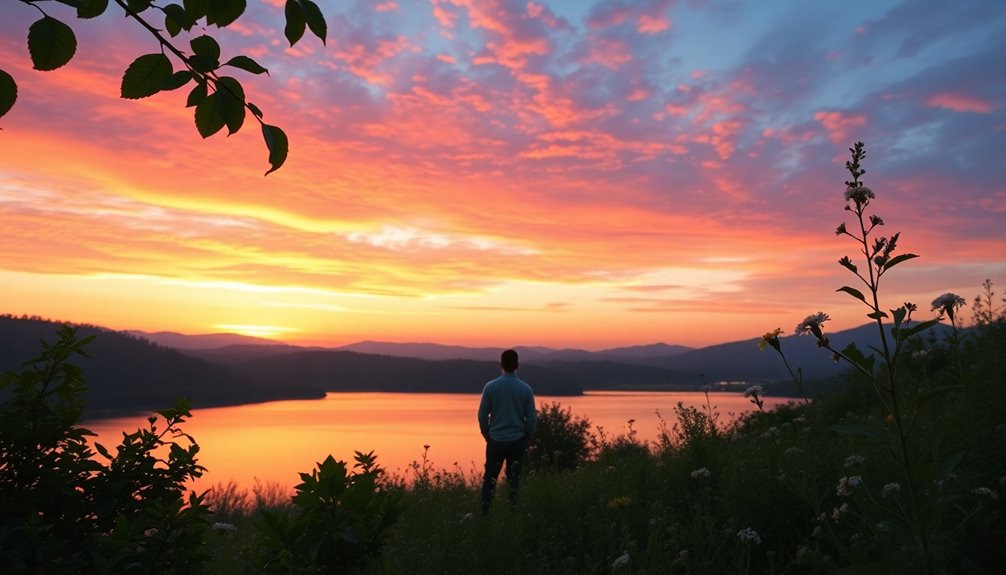
Cultural perspectives on beauty shift dramatically across societies, shaped by historical contexts, religious beliefs, and social norms. You'll find that what's considered beautiful in one culture may differ markedly in another, reflecting unique values and traditions.
- Natural beauty often takes center stage, celebrated in art and rituals.
- Gender roles influence perceptions of beauty, with distinct standards for men and women.
- Media diversity challenges traditional beauty norms, promoting inclusivity.
- Globalization blends beauty ideals, creating space for authenticity.
- Evolving definitions encourage appreciation for individual uniqueness.
As you explore these varied perspectives, notice how beauty intertwines with the environment, shaping artistic expression and cultural identity. Many societies honor the relationship between beauty and nature, fostering a deep appreciation for the world around us.
You'll also see that the representation of beauty is constantly changing, influenced by cross-cultural exchanges. This evolution not only broadens your understanding but also empowers you to embrace a more inclusive and authentic view of beauty.
The Role of Community in Poetry

A vibrant poetry community can feel like a warm embrace, offering support and encouragement to poets at all levels. When you engage with fellow poets, you create an environment where sharing your work becomes a joyous experience. Constructive feedback from peers is essential; it helps you refine your craft and discover new perspectives.
Through positive interactions, you'll not only enhance your creativity but also forge friendships built on shared artistic interests. Community-driven initiatives, like anthologies and poetry readings, present excellent platforms for showcasing your talents and connecting with a wider audience.
Here's a quick look at the benefits of being part of a poetry community:
| Benefits | Description |
|---|---|
| Supportive Environment | Encouragement from peers fosters growth. |
| Constructive Feedback | Helps refine your work and explore new ideas. |
| Diverse Perspectives | Enriches the poetic landscape with varied styles. |
Personal Growth Through Writing
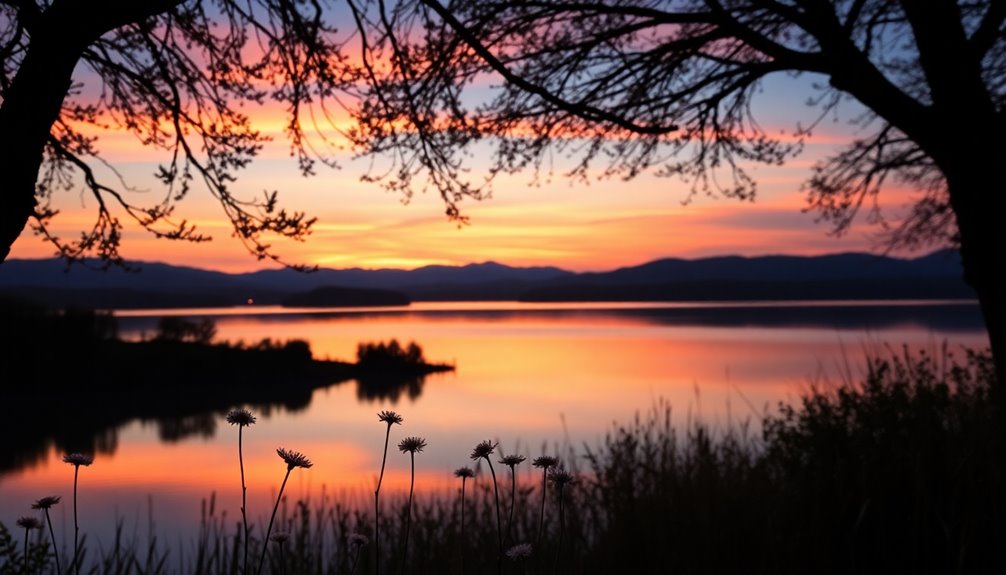
Writing poetry lets you express your emotions in a creative way, transforming your thoughts into powerful words.
This journey not only helps you understand yourself better but also enhances your ability to communicate your unique perspective on beauty.
As you write, you'll discover how each poem can lead to personal growth and deeper connections with the world around you.
Expressing Emotions Creatively
Expressing emotions through creative outlets like poetry can be a transformative experience. When you write, you uncover layers of your feelings and thoughts, allowing for a deeper understanding of yourself. This process isn't just about putting words on a page; it's about reflecting on your beliefs and emotional landscape.
As you put pen to paper, consider these benefits:
- Self-Discovery: Writing helps you explore your emotions and gain clarity on your personal experiences.
- Emotional Healing: Engaging in poetry can lead to processing complex feelings, promoting emotional well-being.
- Skill Development: Regular writing practice enhances your technical abilities and nurtures your unique voice.
- Community Connection: Sharing your work fosters connections with others, reinforcing the importance of mutual support.
- Constructive Feedback: Receiving input from peers in a supportive environment helps refine your craft and builds your confidence.
Transformative Writing Journey
Releasing your thoughts on paper can ignite a transformative journey of personal growth. Writing isn't just about putting words together; it's a powerful tool for self-expression and introspection.
When you immerse yourself in poetry or creative writing, you explore and articulate your emotions, allowing your thoughts to flow freely. This practice encourages continuous improvement in your writing skills and heightens your self-awareness.
As you share your work with peers and the writing community, you'll receive invaluable feedback. Constructive criticism helps refine your voice and deepens your understanding of your art. This exchange fosters connections, creating a supportive network that enriches your creative journey.
Reflecting on personal experiences and weaving them into your writing cultivates resilience and self-acceptance. You'll gain a profound understanding of your identity as you navigate your feelings through words.
Each writing session becomes an opportunity to grow, not just as a writer, but as a person. Embrace this transformative process; let your pen guide you towards self-discovery.
With each line you write, you're not just crafting poetry—you're shaping your own narrative, experiencing personal growth that resonates deeply within you.
Symbolism of Natural Elements

In the world around you, natural elements serve as powerful symbols of beauty, each conveying unique feelings and messages.
From the delicate petals of flowers to the vastness of the night sky, these symbols remind you of the richness of life and the art that nature creates.
- Flowers symbolize beauty, evoking feelings of peace and joy.
- Vibrant sunsets and lush landscapes enhance visual appeal, forging emotional connections.
- Mountains represent aspiration, while rivers symbolize continuity and resilience.
- The changing seasons remind you that beauty is fleeting and should be cherished.
- The night sky and shimmering stars invite contemplation and reflection.
Themes of Love and Reflection
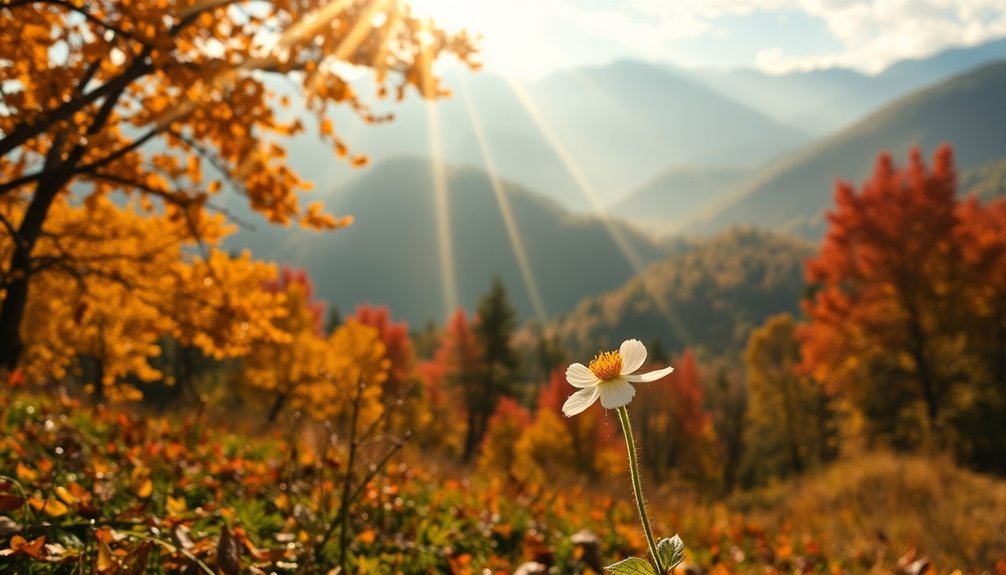
Love weaves itself through the fabric of poetry, creating a tapestry rich with emotion and insight. When you explore the world of poetry, you often find that love serves as a profound source of inspiration, reflecting both the emotional complexities and the transformative power of relationships.
The depiction of beauty intertwines seamlessly with themes of love, capturing the ideals and admiration you hold for that special someone.
As you read, you might notice how reflection plays an essential role in exploring feelings of love. Poets reveal their emotional landscapes and vulnerabilities, allowing you to connect deeply with their experiences. Vivid imagery and sensory details enhance this connection, making the essence of love palpable.
Moreover, the celebration of nature's beauty often parallels expressions of love, illustrating the interconnectedness of human emotions and the natural world. Whether it's a blooming flower symbolizing passion or a serene landscape representing tranquility, these elements amplify your understanding of love.
In this lyrical journey, you're invited to reflect on your own connections, experiencing the profound beauty that love can evoke in both poetry and life.
Historical Context of Beauty Poetry
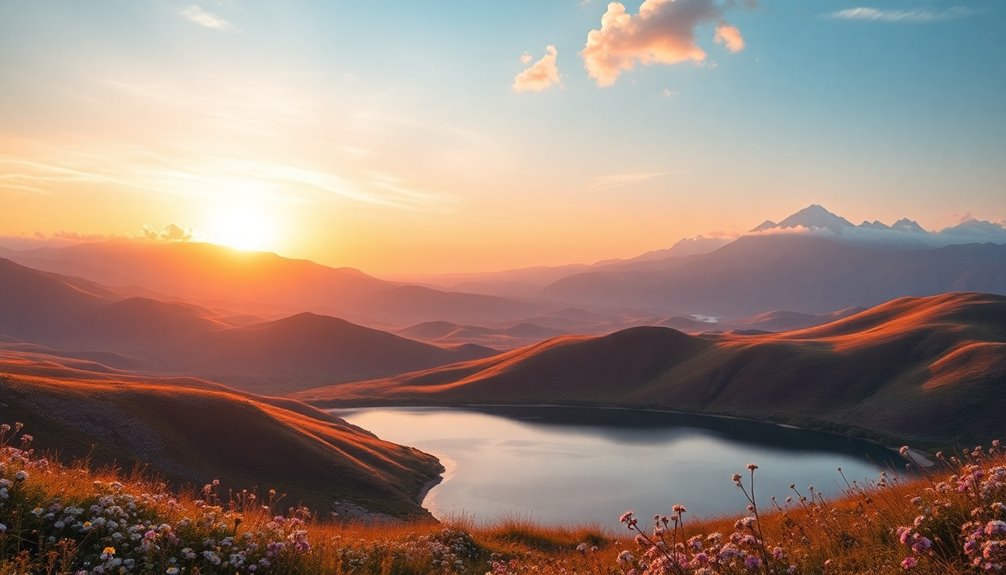
Throughout history, beauty poetry has reflected societal values and cultural aesthetics, evolving alongside literary movements. You'll notice how the Romantic movement of the early 19th century emphasized nature's beauty and the sublime. Poets like Lord Byron celebrated both physical and inner beauty, crafting verses that resonate with emotional depth.
Consider these key aspects of beauty poetry's historical context:
- Divine Muses: Poets often idealized feminine beauty, portraying women as ethereal inspirations.
- Nature Personified: Earlier literary traditions used nature as a symbol of purity and creativity, enriching poetic themes.
- Cultural Shifts: Each era's unique standards of beauty influenced poetic representation, from classical symmetry to Romantic emotionality.
- Imagery and Metaphors: Vivid descriptions and intricate metaphors became tools to explore beauty, reflecting societal norms.
- Literary Evolution: Various movements contributed distinct themes and styles, shaping how beauty intertwines with both nature and human experiences.
Frequently Asked Questions
What Is a Poetry Quote About Beauty?
A great poetry quote about beauty is, "Beauty is truth, truth beauty," from John Keats.
It captures how you perceive beauty as a reflection of deeper truths in life. When you encounter beauty, whether in nature or human connection, it stirs emotions and thoughts that resonate within you.
This quote reminds you that beauty isn't just about what you see; it's about the profound feelings and truths it evokes in your heart.
What Is the Poem About a Thing of Beauty?
"A Thing of Beauty" by John Keats celebrates the enduring nature of beauty in your life.
It reminds you that beauty offers solace and inspiration, especially during tough times.
You'll find that beauty isn't just skin deep; it lies in your connection to nature and art.
Through vivid imagery, the poem shows how beautiful experiences uplift your spirit, fostering love and hope, making life's fleeting moments feel rich and meaningful.
How Do You Write a Beauty of Nature Poem?
Did you know that 90% of the world's biodiversity is found in forests?
To write a poem about the beauty of nature, start by immersing yourself in your surroundings. Notice the vibrant colors and soothing sounds.
Use metaphors and similes to connect these elements to your feelings. Experiment with different poetic forms and rhythmic patterns.
Reflect on your personal experiences in nature, weaving these insights into your verses to create a meaningful connection.
How to Describe Beauty in a Poetic Way?
To describe beauty in a poetic way, you'll want to immerse your readers in vivid imagery.
Paint pictures with words, like the golden hues of a sunset or the soft rustle of leaves.
Use metaphors to connect nature's wonders to human feelings, making them relatable.
Incorporate personification, giving life to elements like the whispering wind.
Finally, embrace rhythm and alliteration, creating a musical flow that captures the fleeting essence of beauty in every line.
Conclusion
In the grand tapestry of life, beauty bursts forth like a thousand suns rising in unison, illuminating every corner of your soul. You're not just a spectator; you're a vibrant brushstroke in nature's masterpiece, feeling the heartbeat of the earth resonate within you. Each poetic line you pen captures the essence of a roaring waterfall and the whisper of the wind, reminding you that true beauty isn't just seen—it's an overwhelming symphony that ignites your very existence.
